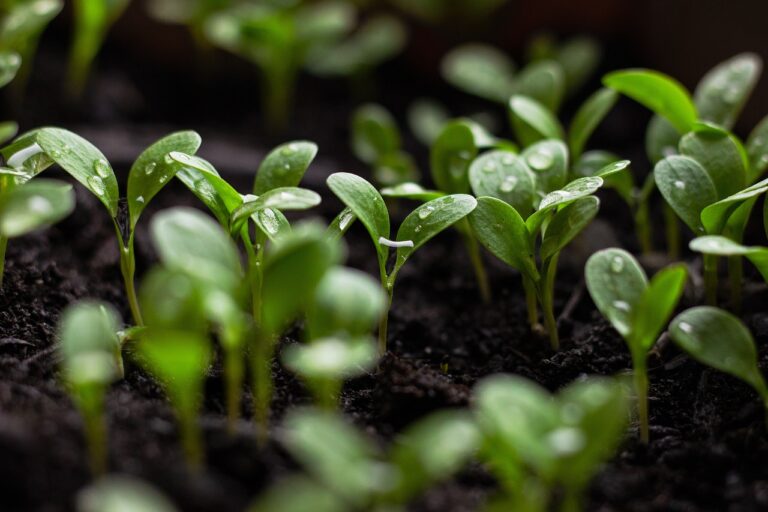The Importance of Soil Health: Foundation for a Thriving Ecosystem

Soil health is fundamental to the success of any garden, farm, or natural ecosystem. Healthy soil supports plant growth, sustains biodiversity, and plays a crucial role in the global carbon cycle. Understanding and maintaining soil health can lead to more productive and sustainable agricultural practices, healthier plants, and a balanced environment. Here are five key reasons why soil health is so important:
Enhances Plant Growth and Crop Yield
Healthy soil is rich in essential nutrients, organic matter, and beneficial microorganisms, all of which are crucial for robust plant growth and high crop yields. Nutrient-rich soil provides plants with the macro and micronutrients they need to develop strong roots, stems, and leaves. Well-structured soil also improves water retention and drainage, allowing plants to access moisture and air efficiently.
The presence of beneficial microorganisms, such as bacteria and fungi, enhances nutrient availability through processes like nitrogen fixation and phosphorus solubilization. Healthy soil supports the development of a resilient root system, enabling plants to absorb water and nutrients more effectively. As a result, healthy soil contributes to more vigorous plant growth, higher crop yields, and improved resistance to pests and diseases.
Promotes Biodiversity and Ecosystem Function
Soil health is integral to maintaining biodiversity and ecosystem function. Healthy soil hosts a diverse range of organisms, including earthworms, insects, fungi, bacteria, and plant roots. These organisms contribute to nutrient cycling, organic matter decomposition, and soil structure formation.
Biodiversity in the soil promotes a balanced ecosystem by supporting food webs and providing habitat for various species. Each organism plays a specific role in maintaining soil health, from decomposing organic matter to controlling pests and diseases. This biodiversity enhances the resilience of the ecosystem, allowing it to recover from disturbances and adapt to changing environmental conditions.
Healthy soil also supports above-ground biodiversity by providing a stable foundation for plants, which, in turn, sustain herbivores, pollinators, and other wildlife. The interplay between soil health and biodiversity creates a self-sustaining system that benefits the entire environment.
Improves Water Management and Conservation
Healthy soil plays a crucial role in water management and conservation. Well-structured soil with high organic matter content enhances water infiltration and retention while reducing runoff and erosion. This means that water is more effectively absorbed and stored in the soil, making it available to plants over time.
In areas prone to drought, healthy soil acts as a reservoir, providing plants with the moisture they need to survive dry periods. In regions with heavy rainfall, healthy soil reduces the risk of flooding by allowing excess water to percolate through the soil profile.
By improving water retention and reducing water loss, healthy soil contributes to more efficient water use in agriculture and gardening. This not only supports plant growth but also conserves water resources and reduces the need for irrigation.
Sequesters Carbon and Mitigates Climate Change
Soil health is a critical component of the global carbon cycle and plays a significant role in mitigating climate change. Healthy soil sequesters carbon by capturing atmospheric carbon dioxide (CO2) and storing it as organic carbon in the soil. This process is facilitated by plants through photosynthesis, where CO2 is converted into organic matter and deposited in the soil through root exudates and decaying plant material.
By increasing soil organic carbon, healthy soil not only enhances soil fertility but also reduces greenhouse gas concentrations in the atmosphere. This carbon sequestration helps mitigate the effects of climate change by lowering the overall carbon footprint.
Additionally, practices that promote soil health, such as cover cropping, reduced tillage, and organic farming, can further enhance carbon sequestration and reduce emissions from agricultural activities. Sustainable soil management is, therefore, a vital strategy for climate change mitigation.
Reduces the Need for Chemical Inputs
Maintaining soil health can significantly reduce the reliance on chemical fertilizers, pesticides, and herbicides. Healthy soil is naturally fertile and supports robust plant growth without the need for excessive synthetic inputs. The presence of beneficial microorganisms enhances nutrient availability and disease resistance, reducing the need for chemical fertilizers and pesticides.
Practices that improve soil health, such as composting, cover cropping, and crop rotation, can suppress weeds and pests naturally, minimizing the need for herbicides and pesticides. By reducing chemical inputs, healthy soil promotes a more sustainable and environmentally friendly approach to agriculture and gardening.
This not only benefits the environment by reducing pollution and chemical runoff but also supports human health by minimizing exposure to harmful chemicals. Sustainable soil management practices contribute to cleaner air, water, and food, creating a healthier and safer ecosystem for all.
In conclusion, soil health is essential for enhancing plant growth and crop yield, promoting biodiversity and ecosystem function, improving water management and conservation, sequestering carbon and mitigating climate change, and reducing the need for chemical inputs. By prioritizing soil health, we can create more productive, sustainable, and resilient agricultural and natural systems. Investing in soil health is an investment in the future of our environment and the well-being of all living organisms. Happy gardening and soil stewardship!






